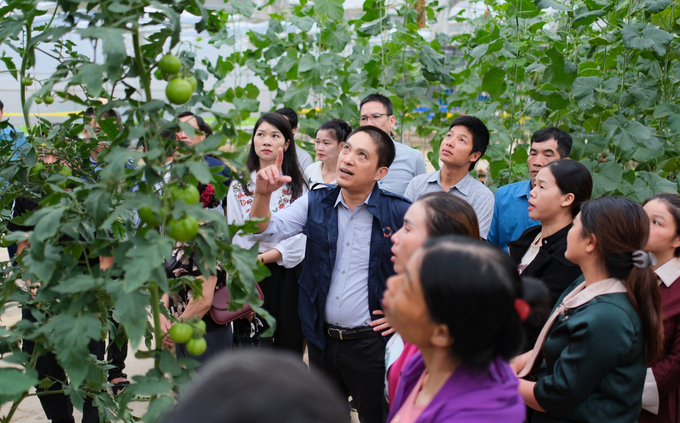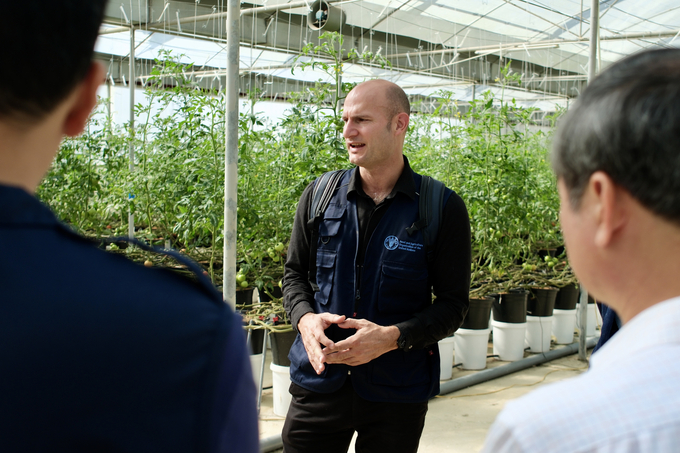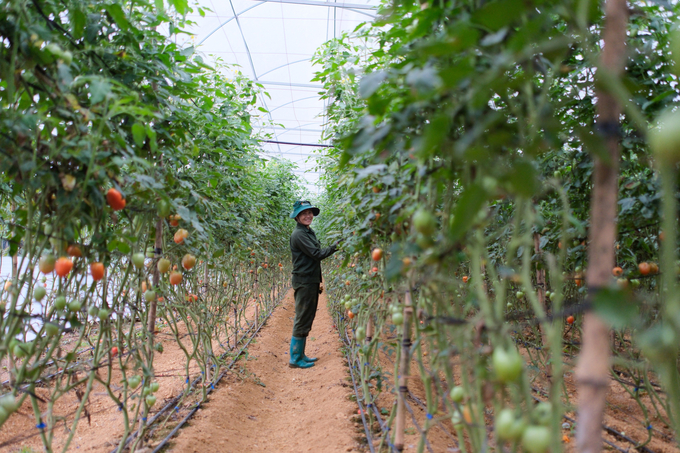November 21, 2025 | 20:46 GMT +7
November 21, 2025 | 20:46 GMT +7
Hotline: 0913.378.918
November 21, 2025 | 20:46 GMT +7
Hotline: 0913.378.918
Over the past decade, since the implementation of the 14th Congress Resolution by the Son La Provincial Party Committee to transform crop structures on sloping land, the development of fruit trees on such terrain has significantly reshaped the province’s agricultural landscape.
Reflecting on this progress, Ms. Cam Thi Phong, Deputy Director of the Son La Department of Agriculture and Rural Development, highlighted that the province’s flexible and effective policies have played a key role in ensuring sustainable agricultural development. Policies supporting initiatives such as greenhouse construction, expanding cultivation areas, and establishing cooperatives have fueled the continuous growth of Son La's agricultural sector.

Farmers in Moc Chau district attending a technical training session on soil-free vegetable cultivation. Photo: Quynh Chi.
Since the adoption of Resolution No. 08 by the Son La Provincial Party Committee, focusing on the concentrated and sustainable development of agriculture, forestry, and fisheries with the application of high technology by 2025 (with a vision to 2030), Son La has achieved remarkable progress. The province has become a standout performer nationwide, leading the North and ranking second in the country in terms of fruit tree cultivation area.
Nevertheless, despite having over 210,000 hectares of farmland, only 51 hectares are dedicated to high-tech greenhouse cultivation – a modest 0.02%. While Son La has introduced policies to promote and support smart agriculture, limited financial resources remain a barrier for many farming households to invest in greenhouse technology.
Ms. Cam Thi Phong noted that some existing policies have revealed limitations and need to be revised to better align with current realities. To address these issues, the Department of Agriculture and Rural Development of Son La province plans to recommend amendments to Resolution 128 issued by the Provincial People’s Committee. These amendments aim to further encourage enterprises and cooperatives to invest in the agricultural and rural sectors.

Dr. Leone Magliocchetti Lombi, Agricultural Officer at FAO, visits a greenhouse model supported by the project in Son La province. Photo: Quynh Chi.
Son La’s agricultural transformation has also been significantly supported by contributions from various projects, organizations, and domestic and international research institutions. The province actively engages investors and supports programs to foster agricultural and rural development.
In addition to the “Smart Agriculture for Future Generations” project, a range of other initiatives has positively impacted Son La’s agricultural sector. Notable examples include projects to enhance climate change adaptation in the coffee value chain; improve sustainable animal productivity for livelihoods, nutrition and gender inclusion gender equity; and promote market-oriented agroforestry and forest restoration in the Northwest region.
“With active support from local authorities across all project activities, farmers in Son La have undergone significant changes in mindset, awareness, and production practices,” Ms. Cam Thi Phong emphasized. “They are increasingly attuned to market demands and better equipped to adapt to new challenges.”
The “Smart Agriculture for Future Generations” project stands out as a key example of multilateral cooperation in Son La. Through the project, 34 farmers in Moc Chau district have received technical training from the Food and Agriculture Organization of the United Nations (FAO) and the Fruit and Vegetable Research Institute (FAVRI). This support has enabled them to improve techniques for maintaining soil and plant health, gaining their confidence in producing clean vegetables and fruits.

Son La farmers are increasingly investing in high-tech fruit and vegetable production. Photo: Quynh Chi.
“While farmers have gained access to advanced farming technologies, significant gaps remain,” said Dr. Nguyen Quoc Hung, Director of the Fruit and Vegetable Research Institute. “The project has primarily focused on production, but subsequent stages, such as harvesting, preliminary processing, and post-harvest preservation, are still underfunded and underdeveloped.”
Under the project’s plan, 34 participating farming households will receive support to register for and obtain VietGAP certification. This certification represents a critical milestone, paving the way for Moc Chau’s safe vegetable products to establish a strong market presence.
Dr. Hung also highlighted the importance of developing direct-to-consumer sales channels to reduce reliance on intermediaries. “By doing so, we can ensure more stable product values for consumers and increase profits for farmers,” he explained.
Director of FAVRI stated that, for Son La’s agricultural products to expand further and penetrate larger markets, close collaboration among farmers, policymakers, investors, and the province’s agricultural processing systems is essential.
Translated by Quynh Chi

(VAN) Results from the Sustainable Durian Model Project in Dak Lak have confirmed the critical role of Yara Viet Nam in transferring advanced nutritional solutions to farmers.

(VAN) In Tuyen Quang province, livestock farmers have introduced effective models and innovative practices that significantly strengthen African Swine Fever prevention and control efforts.

(VAN) This is the study conducted by IRRI and Can Tho University on the rice straw value chain in Mekong Delta showing an economic potential of more than 6.6 trillion VND/year.

(VAN) By participating in cooperative economics, many farmers in Tay Ninh have overcome hardship, mastered clean dragon fruit cultivation techniques.

(VAN) The crossbreeding program in the former Binh Dinh province (now part of Gia Lai) has shown signs of decline, and urgent measures are needed to revive it and sustain past achievements.

(VAN) The agricultural sector agreed on a roadmap to pilot the MRV protocol and expand low-emission rice production from the 2025-2026 winter-spring crop.

(VAN) Agricultural extension officers in Quang Ninh do more than transmit knowledge; they have become a steadfast support system for farmers on the path to sustainable agricultural development.